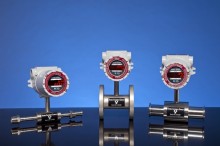Thermal Mass Flow Meters Measuring Carbon Dioxide (CO2)
Carbon Dioxide is generally not produced, rather is derived as a by-product from other processes such as the manufacturing of ammonia, fertilizers, power generation and other naturally occurring events. The gas is then captured, cleaned, and bottled to be used in a wide variety of industrial processes. These processes require measurement and that measurement can be performed by a Thermal Instrument Mass Flow Meter.

The use of Carbon Dioxide Gas (CO2) and then how it is captured in industrial applications has been scrutinized over these past few years, with all the discussion of greenhouse gases. Thermal Instrument Mass Flow Meters have been used to measure the CO2 that is being used, and then re-captured in order to minimize GHG’s being released to the atmosphere.
Thermal Instruments Model #600-9 has a variety of process connections and the ability to be placed in line sizes as small as 1/4″, has been reliable measurement instrument for our customers that are managing their C02 usage. The in-line unit has negligible pressure drop (application dependent), high repeatability, and the accuracy needed to manage this process for many years. Our mass flow meters have been utilized in beverage manufacturing, power generation, and other manufacturing operations to name a few.
The Thermal Instrument Mass Flow Meter is available in standard 316 Stainless Steel for your industrial applications, and in a Sanitary (Model #600-9SAN) design that meets the requirements of Food, Beverage, and Pharmaceutical manufacturers if necessary.
Common Carbon Dioxide applications for our mass flow meter are:
-
Measuring the CO2 by-product at coal fired power plants for recovery, or to be sold as an additional product
-
Measuring CO2 in the carbonization and bottling process in the beverage industry
-
Food Processing for freezing or chilling, and packaging operations
-
Injecting CO2 into the ground during hydraulic fracturing near or at the site of oil wells to draw out every last trace of crude oil
-
As a raw material in the chemical industry
-
Used to enhance algae production for nutritional and health sciences
-
Cleaning the circuitry during the semiconductor manufacturing process removing impurities in place of chemical solvents


Follow Us!